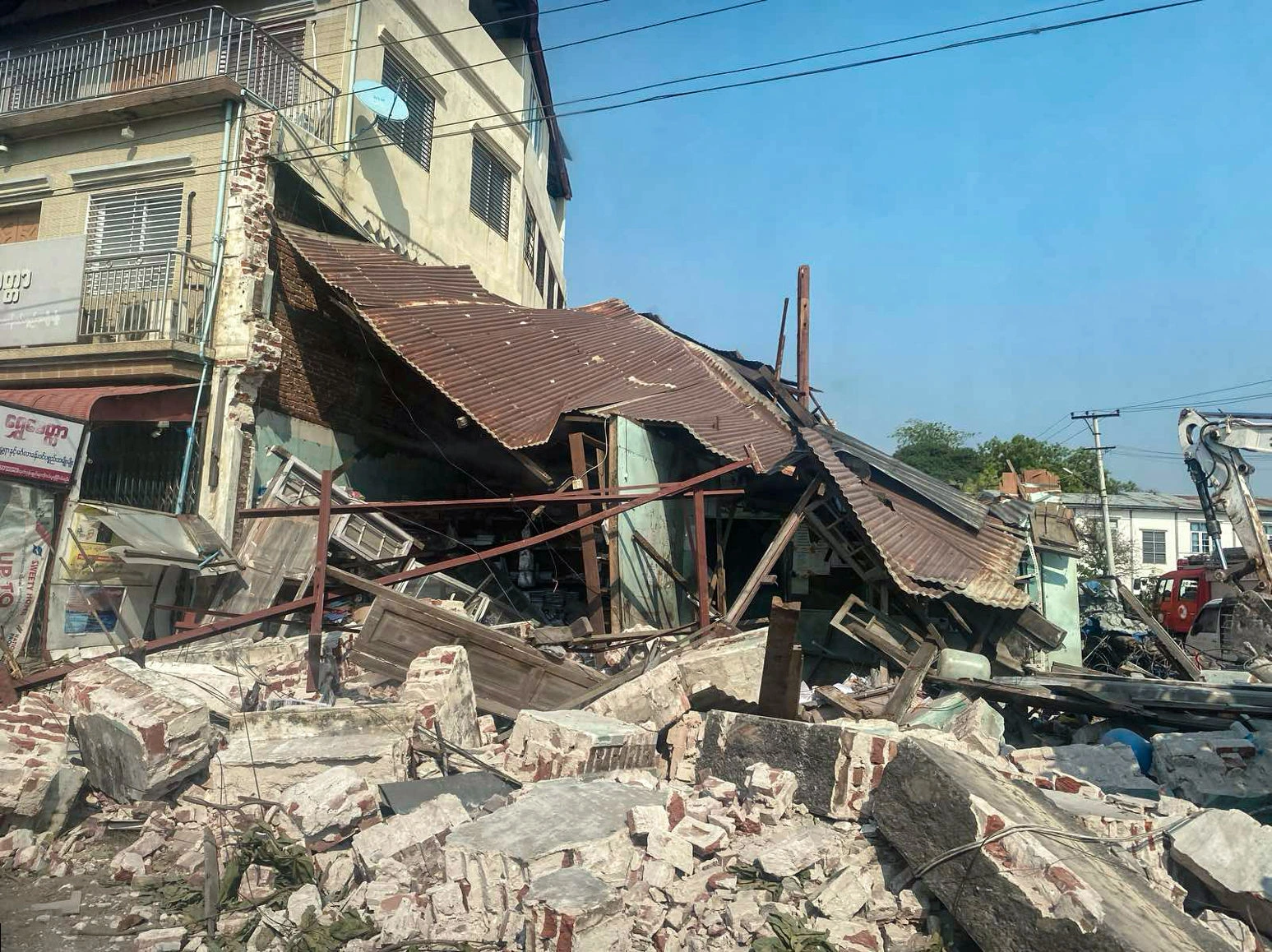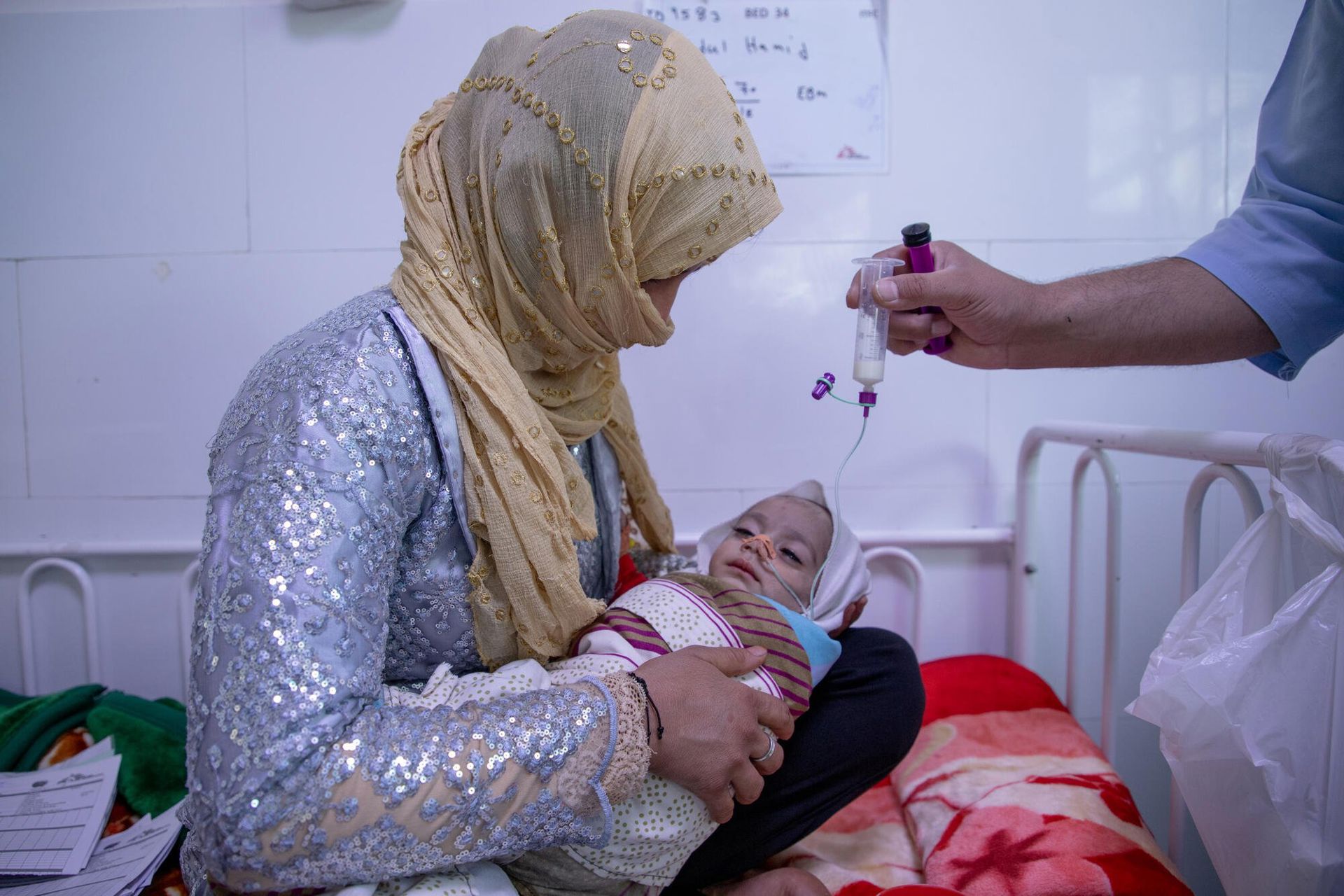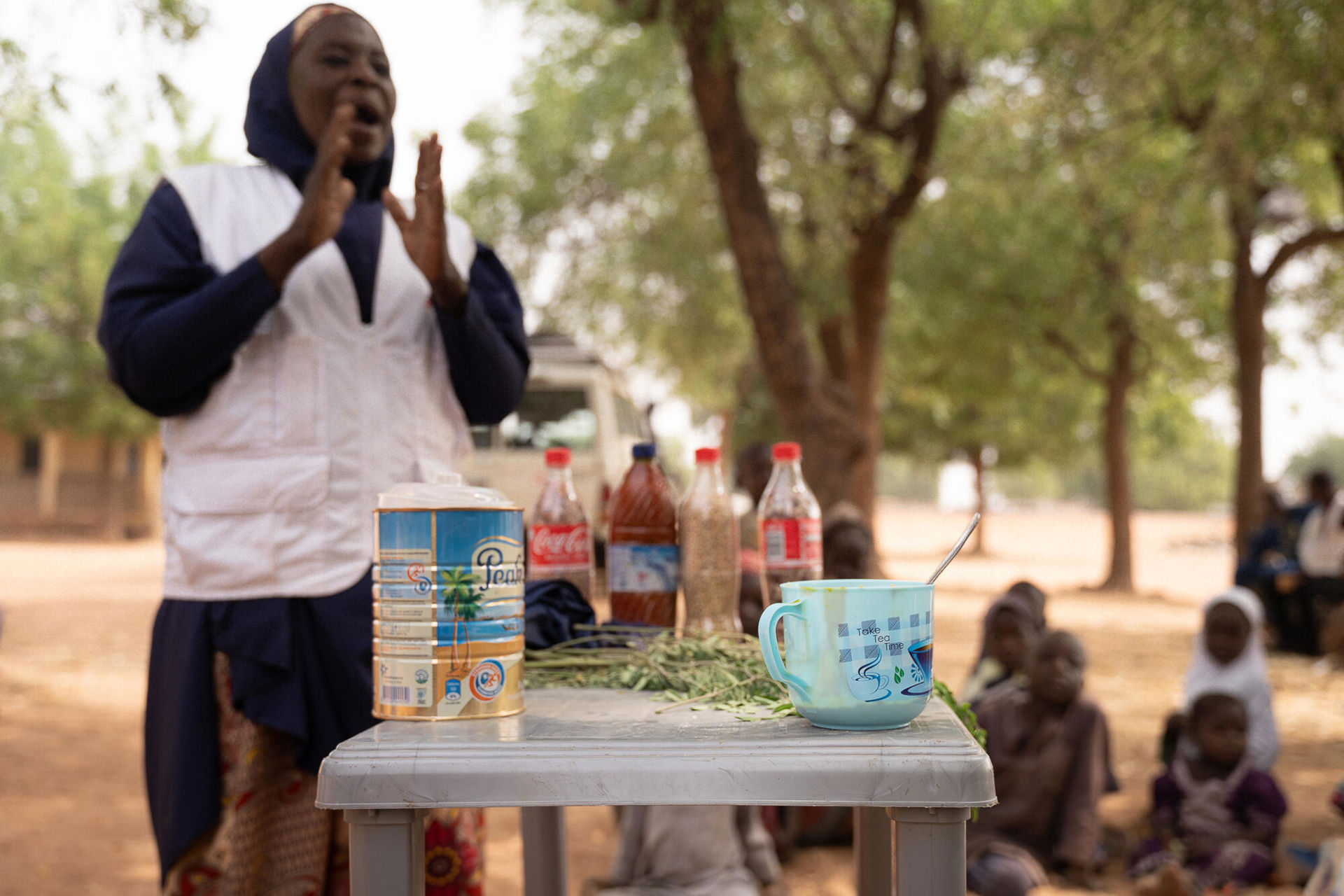The baby lies with his eyes closed, his fleecy blanket a riot of reds, pinks and greens. On his nose a sticking plaster holds the tubes in place that run into the tiny nostrils, feeding him a milk solution that should help him regain his strength. His mother watches him intently from a nearby chair, as close by some of the other women in the room talk and laugh, their children lying on the bed between them. The inpatient therapeutic feeding centre (ITFC) in Herat is busy, the rooms small for the number of beds accommodating malnourished children and their caregivers.
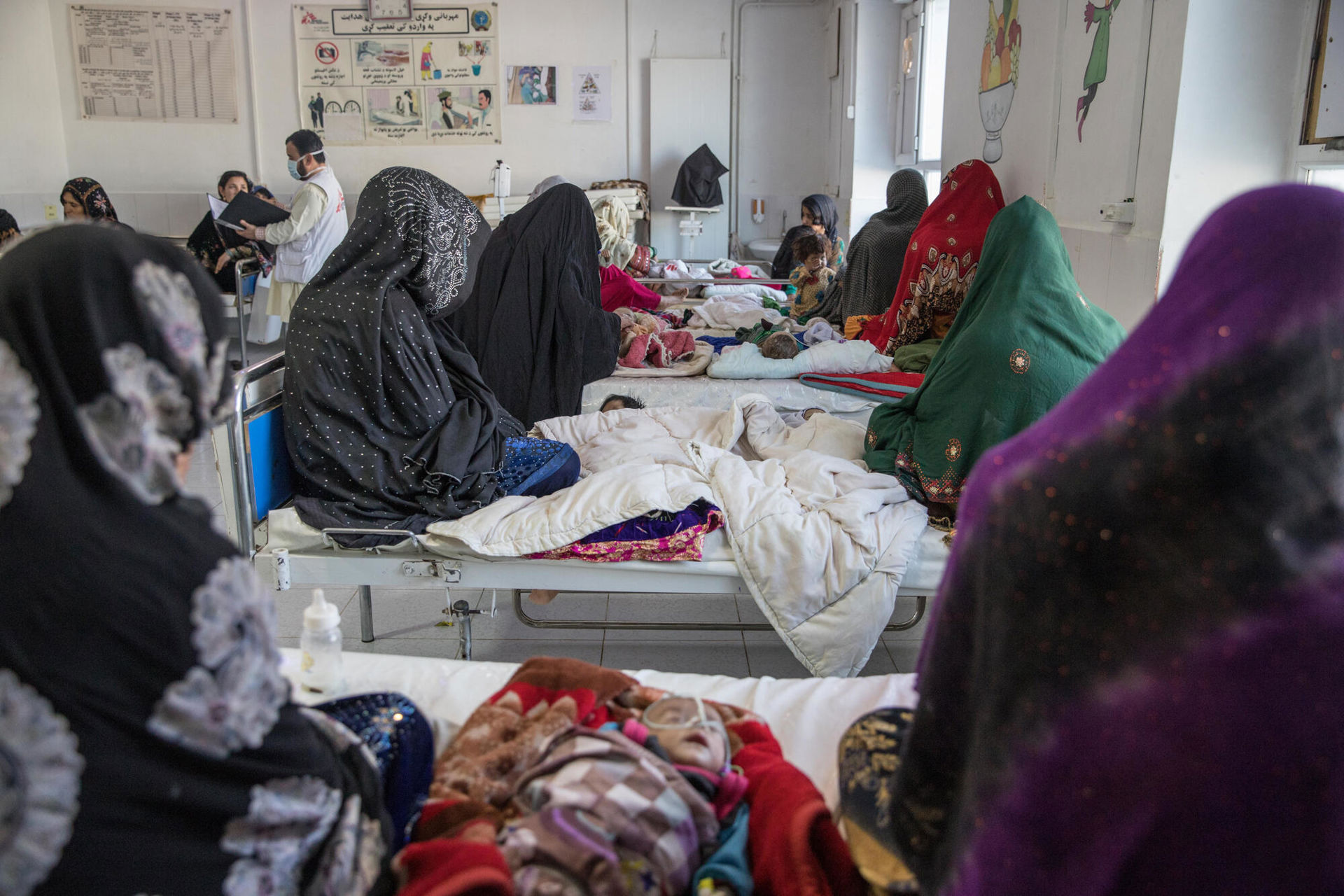 The inpatient therapeutic feeding centre at the MSF-supported Boost hospital in Lashkar Gah, Helmand province. Because of the large number of admissions two patients and their caretakers have to share one bed.(Photo taken at 2022) © Oriane Zerah
The inpatient therapeutic feeding centre at the MSF-supported Boost hospital in Lashkar Gah, Helmand province. Because of the large number of admissions two patients and their caretakers have to share one bed.(Photo taken at 2022) © Oriane Zerah
Further south, in Helmand, there are similar scenes in Boost Hospital. During admission, a nurse slips the coloured band of the mid-upper arm circumference (MUAC) tape over Nazifa’s small arm and pulls the plastic tighter. It settles firmly in the red, pointing towards malnutrition. She will then be measured and weighed before being admitted and will stay for a couple of weeks to stabilise her weight and treat her diarrhoea. Parents speak of the challenge of feeding their families because of lack of money rather than lack of food, but alongside that are the consequences of inadequate food or nutrition on breastfeeding mothers and the knock-on effect on infants. Some mothers are not able to produce enough milk, “When he was born, he was healthy but I didn't have breastmilk so we started infant formula to feed him but that made him sick”. The mothers in turn can find themselves enrolled for outpatient malnutrition care.
“We have come here from Kamari in Badghis Province, a journey of four hours”, explains Fatima* who has brought her son to Herat for treatment for malnutrition and chickenpox. They had previously sought help at a clinic closer to home but were unable to find the help they needed. MSF hospitals and clinics, as well MSF-supported Ministry of Public Health (MoPH) hospitals, are receiving patients who travel long distances because they struggle to access quality healthcare close to home. Afghanistan’s dire economic situation means that most people who might previously have been able to afford care in private clinics now rely on health centres supported by international organisations. Roya – a mother whose child has been in the hospital for the last two weeks – says that in her village nearly all the children are suffering from malnutrition because of the economic situation, “they do not have money, even if it's 50 or 100 Afghani (70 cents or US$1.40) to pay for the taxi to bring their children here for treatment”.
Sitting outside on benches in Kandahar, the sun reflecting off the grey gravel, mothers wait patiently with their children on their laps and medical documents clasped tightly in their hands. Some distance away in a separate area sit the fathers, brothers and uncles. From here the small patients and their parent or guardian will be called into a container office for assessment. If they are severely malnourished without medical complications, they will be enrolled in outpatient care for malnutrition and provided with ready-to-use therapeutic food, which they will take home before coming back the following week for a check-up. This will continue for a period of six to eight weeks, until they are considered cured. Over the course of 2023, MSF-run and MSF-supported facilities in Herat, Lashkar Gah and Kandahar admitted a total of over 10,400 children aged up to five years, and between January and April 2024 admitted 2,416 patients, already a 5 per cent increase compared to the same period the previous year. Teams in Herat and Kandahar enrolled over 6,900 children in ambulatory therapeutic feeding centres (ATFCs) in 2023.
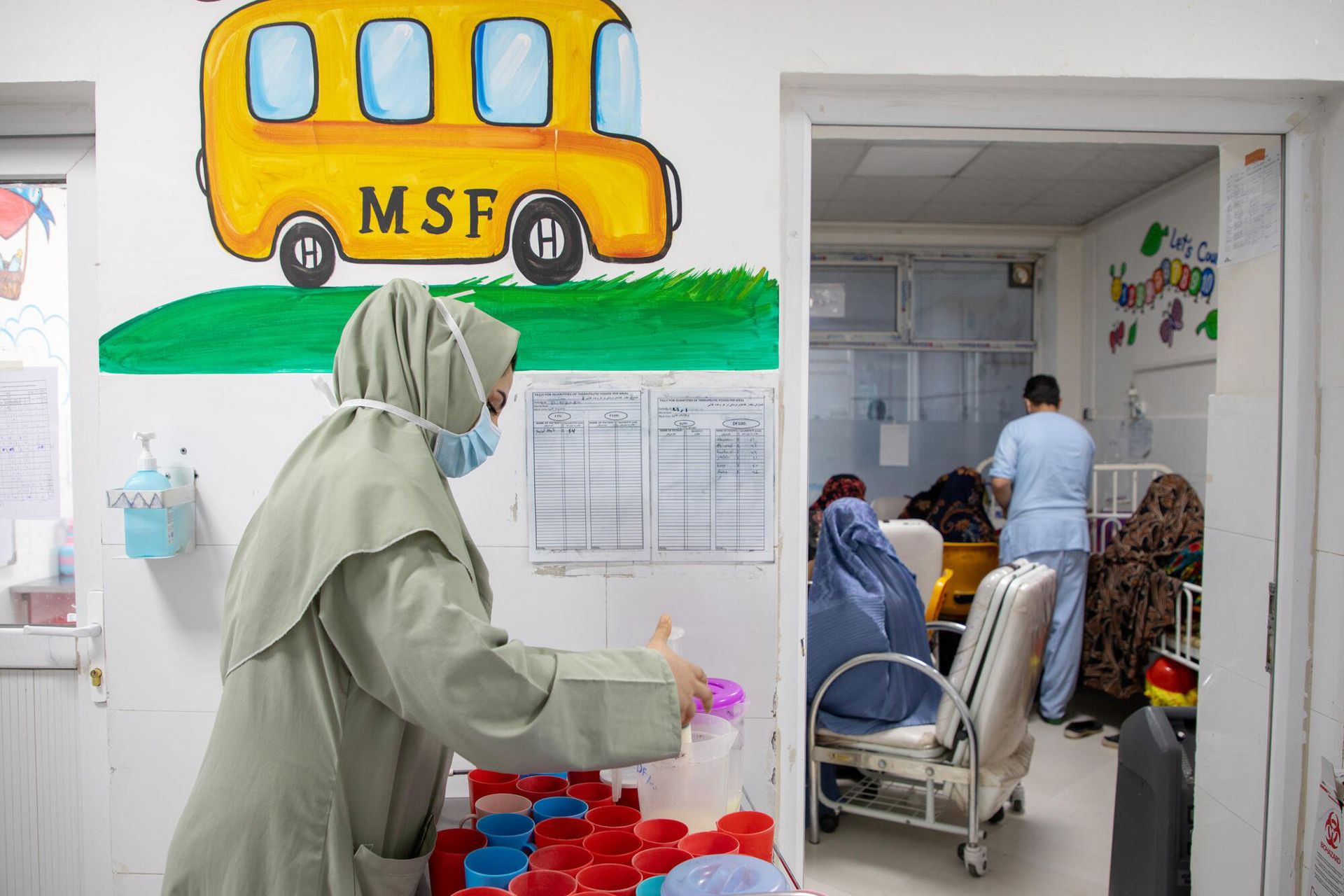 Inpatient Therapeutic Feeding Centre (ITFC) in Herat Regional Hospital.
Inpatient Therapeutic Feeding Centre (ITFC) in Herat Regional Hospital.
“In Herat, many of the patients we see are under one year old and this points to issues with breastfeeding and complementary feeding (introducing nutritious food in addition to breastmilk). Something we are working to address through our health promotion activities with the mothers and their families”, explains Aline Plener, MSF Medical Coordinator in Afghanistan. “Children under six months are also often too young to be enrolled in many of the nutrition programmes, so it’s harder for the families to get them the care they need when they’re malnourished and without a broadening of admission criteria this will remain the case.”
Often the inpatient wards for malnutrition are so crowded that two babies and their mothers share the same bed, a far from ideal situation for them or from a medical point of view. Some are treated by MSF, go home, and then are back again a few weeks later – the root causes of their malnutrition unaddressed. For those with congenital diseases, this is because the necessary specialised hospital care is hard to find, often far away from home, and expensive. Some mothers like Roya, though, are being offered temporary relief: “My child's health has completely changed for the better and she’s recovering. We're at a stage where we can leave for home.”

